The Chinese word Tao and Western phrase the Laws of Nature refer to largely the same thing: that which is responsible for the regularity, complexity and organization we find in the universe. They do so, however, from nearly opposite perspectives. Tao emphasizes what we don’t know, the mystery of this phenomenon; science emphasizes what we do know and are able to use dependably. The Taoist approach is existential and holistic; the scientific approach is abstract and reductive. The Taoist approach... Read more





















